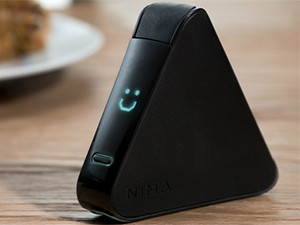
Nima, a smartphone-sized portable device, helps users test whether or not their food is gluten-free.
While gluten-free food has become something of a fashion statement, the alleged health benefits of which many dismiss as a fad-based on poor dietary science, maintaining a strict gluten-free diet can be of vital importance to people with gluten-related health issues, such as celiac disease.
For these groups of people, navigating meals away from home can be a stressful process, says Nima.
Many restaurants and processed food manufacturers lie or bend the truth about the verity of their "gluten-free" options, for example by selling low-gluten food that is not truly gluten-free; or gluten-free food that has been cross-contaminated with food containing gluten; for example by frying it in the same oil.
Many dismiss the existence of genuine gluten-induced health problems altogether. In 2011, a New York City chef admitted to blatantly lying to diners about their pasta being gluten-free, serving them traditional, wheat-based pasta instead.
For these reasons, eating "gluten free" food away from home can be risky and stressful for those who need to. Nima aims to help remove this risk and stress by allowing users to chemically test small portions of the food they are served to determine whether it is truly safe.
To test their food with Nima, users fill one of the device's small, disposable capsules with a small amount of their food: the device works for both liquids and solids. According to Nima's Web site, chemicals inside the capsule then react with the food, and the resultant mixture is then released onto a test strip in the capsule. The device's sensors then analyse the test strip, and - the entire process taking about two minutes - Nima then displays a smiley face if the food is found to contain fewer than 20 parts per million of gluten. If not, Nima frowns.
Nima markets itself as "the first portable device that allows you to test your food, beginning with gluten," suggesting that it aims to branch out to cover other food types and allergens at a later stage.
The device starter kit - which includes three disposable capsules - can be pre-ordered for $199, and will cost $249 when it is released in mid-2016. Twelve-packs of disposable capsules will be shipped regularly on a subscription basis.
Share